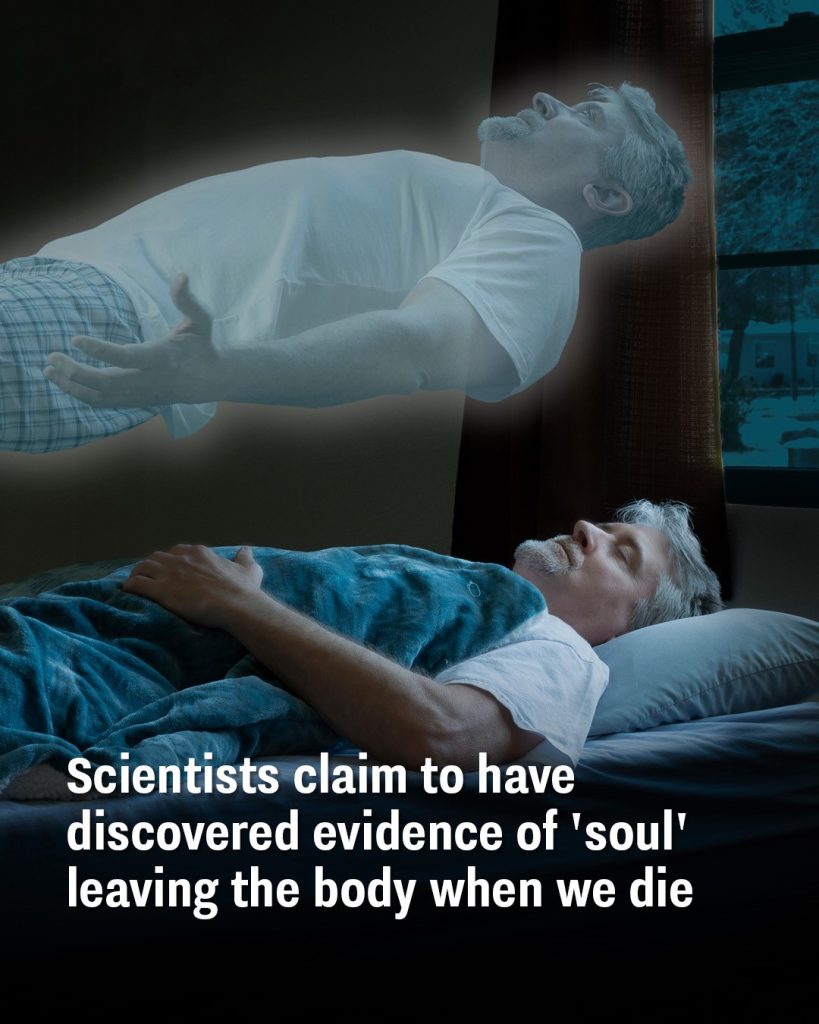The Science of the Soul: Have Researchers Finally Captured the Moment of Departure?
For centuries, humanity has grappled with one of life’s greatest mysteries: what happens when we die? Religious and philosophical traditions have long spoken of a soul that transcends the physical body, but until now, science has largely dismissed such claims as unprovable. However, recent groundbreaking research may be challenging that perspective.
A team of researchers has allegedly documented what appears to be evidence of an energy-like force leaving the body at the moment of death, sparking intense debate among scientists, spiritualists, and skeptics alike. The implications of this discovery could revolutionize our understanding of consciousness, life, and the possibility of an afterlife.
A Mysterious Departure: Capturing the Moment the Soul Leaves the Body
This stunning image, reminiscent of near-death experience (NDE) accounts, depicts a glowing, ethereal form rising above a sleeping body—symbolizing what some believe is the “soul” escaping its mortal vessel. While initially dismissed as artistic interpretation, new technological advancements have made it possible to detect and measure previously unobservable energy fluctuations occurring at the precise moment of death.
According to the research team, experiments conducted in controlled environments have captured inexplicable changes in body weight, electrical activity, and thermodynamic properties during end-of-life transitions. Some researchers suggest that these findings align with Einstein’s principle that energy cannot be destroyed—implying that consciousness, in some form, might persist beyond biological death.
Scientific Theories and the Debate on Consciousness
Though mainstream science has often resisted the idea of a soul, some experts have begun to explore the possibility that human consciousness exists independently of the brain. Prominent theories include:
- Quantum Consciousness Theory: Proposed by physicist Sir Roger Penrose and anesthesiologist Stuart Hameroff, this theory suggests that consciousness arises from quantum vibrations inside the brain’s microtubules. If correct, it implies that consciousness may not be confined to the brain but could exist in the universe at large.
- Biocentric Universe Theory: Scientist Robert Lanza proposes that death is merely an illusion created by human perception and that consciousness continues to exist in different dimensions.
- Energy Transfer Hypothesis: Some researchers argue that at the time of death, a measurable form of bioenergetic discharge leaves the body, possibly supporting the idea that consciousness is a form of energy that persists in some way.
While these ideas remain controversial, they challenge the long-held assumption that consciousness ceases entirely at death.
The Role of Near-Death Experiences and Spiritual Perspectives
This new evidence aligns with thousands of recorded near-death experiences (NDEs), in which individuals describe floating above their bodies, seeing a bright light, and feeling an overwhelming sense of peace. Many return with vivid memories of encountering deceased loved ones or experiencing a “life review”—concepts that align with spiritual beliefs in the soul’s journey beyond death.
Religious traditions have long embraced the idea of a soul:
- Christianity speaks of the soul ascending to heaven or descending into other realms.
- Hinduism and Buddhism believe in reincarnation, where the soul transitions into a new life.
- Indigenous cultures often describe the soul as an eternal force connected to ancestors and nature.
With scientific research now suggesting measurable phenomena related to these age-old beliefs, could we be on the verge of proving what many have intuitively known for centuries?
Conclusion: A Paradigm Shift in Human Understanding?
While skeptics caution against premature conclusions, the possibility that the soul—or some form of conscious energy—leaves the body upon death is gaining scientific traction. If proven, this discovery would mark one of the most significant revelations in human history, fundamentally altering our understanding of life, death, and existence itself.
Are we on the brink of uncovering the truth about what happens after we die? The search for answers continues, but one thing is clear: the mystery of the soul has never been closer to scientific validation.


